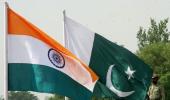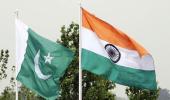Pakistan-India bilateral relations remained frozen for the fourth year over the vexed Kashmir issue but analysts hope the strained ties could be repaired if Nawaz Sharif becomes the prime minister for a record fourth time in the general elections in February in the absence of his main challenger Imran Khan who is in jail in multiple cases.

The main highlight of the outgoing year was a visit to India by then-foreign minister Bilawal Bhutto Zardari in May to attend the Shanghai Cooperation Organisation (SCO) ministerial moot in Goa.
The usual pre-visit hype centred on the question of any meeting between Bilawal and his Indian counterpart S Jaishankar.
But both sides did not show any desire for such a meeting. Instead, the two leaders in their official speeches at the ministerial huddle, targeted each other's countries through innuendoes and pointed jargon.
Bilawal's choice of words, especially urging the participants not to let terrorism hinder political relations, irked many in India.
Jaishankar in his address to the SCO meeting underscored the importance of stopping the issue of cross-border terrorism.
Thus, Bilawal's trip, which was the first by a Pakistani foreign minister to India in almost 12 years, failed to repair the strained ties which remained frozen over the Kashmir issue.
Pakistan downgraded its diplomatic relations with India by expelling its envoy in Islamabad and stopped trade ties following New Delhi's decision to revoke the special status of Jammu and Kashmir in August 2019 after abrogating Article 370 of the Constitution.
In December, Pakistan's current caretaker government and Pakistani political leaders also reacted sharply to India's Supreme Court upholding the Indian government's decision to abrogate Article 370 of the Constitution.
As the year 2023 fades into history, it leaves a feeble ray of hope that changes may come in the India-Pakistan equation due to the changing regional situation and domestic compulsions.
Pakistan has lately found itself in an enviable position due to the floundering of its gamble in Afghanistan.
The Taliban takeover has badly backfired, as the rulers in Kabul have refused to break ties with the Tehreek-e-Taliban Pakistan militants, who are responsible for the endless bloodbath in the country, forcing Islamabad to recalibrate its stance and options.
The immediate result has been the issuance of marching orders for hundreds and thousands of Afghans living illegally.
So far, more than 400,000 have been expelled. The orders have not been reversed despite protests and threats by the Taliban regime in neighbouring Afghanistan.
Second, elections are slated to take place on February 8 next year, and former three-time premier Nawaz Sharif, who returned from the UK after a four-year self-exile, is likely to make a record fourth-time ascendancy to power.
As a prelude to his rise to power, 73-year-old Sharif has been acquitted in all corruption cases and enjoys the protocols of a prime minister-designate.
According to analysts, Sharif is considered an ardent advocate of having good ties with all neighbours, especially India.
He made his intention clear while addressing his party leaders in Lahore on December 7, when he said that repairing diplomatic ties with neighbouring nations, including India, Afghanistan, and Iran, was on the agenda of his Pakistan Muslim League-Nawaz (PML-N) party.
"How can you achieve global status when your neighbours are upset with you?" he asked.
Sharif, who had opposed the Kargil war of 1999 and was later ousted by then-military chief Pervez Musharraf because he was against this 'misadventure', said that he was right to oppose it.
"Time has proved us right as far as the Kargil episode is concerned," he said, which may have been well received by his audience in India.
Sharif talking about his successes during his previous tenures also included improvement in the ties with India and sought endorsement of his policy towards India by posing a question: "During whose tenures did two Indian prime ministers visit Pakistan? First Atal Bihari Vajpayee and later Narendra Modi."
After his Lahore address, the leading Dawn newspaper quoted a political observer saying Sharif has a record of improving ties with India.
"Improving ties with India has always remained a point of conflict between Nawaz and the establishment in the past. Whenever Nawaz Sharif came to power, he tried to shake hands with India against the wishes of the powers that be," the paper quoted the expert without identifying him.
He enjoys good relations with Prime Minister Narendra Modi who, like him, is in a race to gain power for another term in the next year's elections. Their presence on the two countries' national scenes may help ease bilateral tension.
Pakistan would also like to keep its eastern front quiet to focus on the Taliban threat.
Caretaker foreign minister Jalil Abbas Gilani also referred to this point during a press conference after the Indian Supreme Court judgment on Kashmir status.
When asked about the decision's impact on the security situation on the Line of Control, he said that Pakistan would like to maintain peace on the LoC.
While Sharif's return is smooth, former cricketer-turned-politician Imran Khan is struggling in jail to remain relevant in politics.
He has alleged that his party members were targeted, arrested and stopped from filing nomination papers for the February 8 elections despite assurances from the top poll body and the judiciary.
Khan, who was granted bail in the Cipher case, will remain in jail as he is convicted in the Toshakhana corruption case.
On the economic front, cash-strapped Pakistan's economy has been in a free-fall mode for the last many years, bringing untold pressure on the poor masses in the form of unchecked inflation.
Pakistan's shaken economy has compelled it to approach several nations seeking fiscal help in the form of loans.
A loan package from the International Monetary Fund (IMF), approved in July, helped Pakistan avert a sovereign debt default.
Under the $3 billion standby arrangement (SBA), Pakistan received $1.2 billion from the IMF as the first tranche in July.
Pakistan has also been facing a rise in violence in the wake of the Taliban seizing power in Afghanistan in August 2021. Throughout this year, terrorists and separatists have been targeting security forces across Pakistan.
The outgoing year saw the rise of a new militant outfit -- Tehrik-e-Jihad Pakistan (TJP), a newly formed militant group that is an affiliate of the banned TTP.
The group carried out multiple attacks targeting security forces including one of the worst terror attacks targeting the military in recent years that killed 23 soldiers in the restive Khyber-Pakhtunkhwa province in December's second week.
On November 4, the TJP militants attacked the Pakistan Air Force's Mianwali Training Air Base, some 300 km from Lahore, damaging three grounded aircraft.
A day earlier 17 soldiers were killed in three separate terror strikes in the country.
Pakistan's establishment has said it will fight back till the menace of terrorism is eliminated.










 © 2025
© 2025